(完整)巧解初中英语时态试题(2)
- 格式:doc
- 大小:25.07 KB
- 文档页数:12
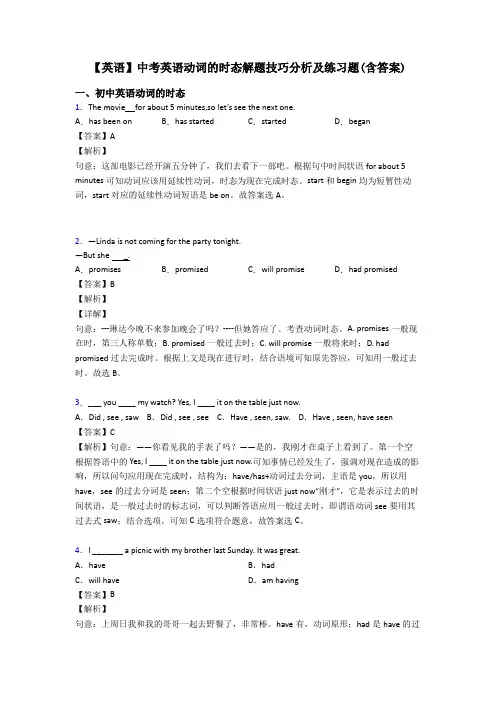
【英语】中考英语动词的时态解题技巧分析及练习题(含答案)一、初中英语动词的时态1.The movie for about 5 minutes,so let’s see the next one.A.has been on B.has started C.started D.began【答案】A【解析】句意:这部电影已经开演五分钟了,我们去看下一部吧。
根据句中时间状语for about 5 minutes可知动词应该用延续性动词,时态为现在完成时态。
start和begin均为短暂性动词,start对应的延续性动词短语是be on。
故答案选A。
2.—Linda is not coming for the party tonight.—But she _.A.promises B.promised C.will promise D.had promised【答案】B【解析】【详解】句意:---琳达今晚不来参加晚会了吗?----但她答应了。
考查动词时态。
A. promises一般现在时,第三人称单数;B. promised一般过去时;C. will promise一般将来时;D. had promised过去完成时。
根据上文是现在进行时,结合语境可知原先答应,可知用一般过去时。
故选B。
3.___ you ____ my watch? Yes, I ____ it on the table just now.A.Did , see , saw B.Did , see , see C.Have , seen, saw. D.Have , seen, have seen【答案】C【解析】句意:——你看见我的手表了吗?——是的,我刚才在桌子上看到了。
第一个空根据答语中的Yes, I ____ it on the table just now.可知事情已经发生了,强调对现在造成的影响,所以问句应用现在完成时,结构为:have/has+动词过去分词,主语是you,所以用have,see的过去分词是seen;第二个空根据时间状语just now“刚才”,它是表示过去的时间状语,是一般过去时的标志词,可以判断答语应用一般过去时,即谓语动词see要用其过去式saw;结合选项,可知C选项符合题意,故答案选C。
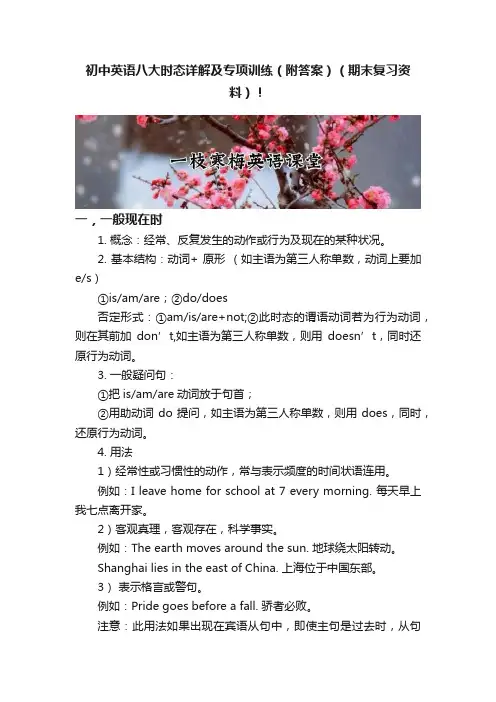
初中英语八大时态详解及专项训练(附答案)(期末复习资料)!一,一般现在时1. 概念:经常、反复发生的动作或行为及现在的某种状况。
2. 基本结构:动词+ 原形(如主语为第三人称单数,动词上要加e/s)①is/am/are;②do/does否定形式:①am/is/are+not;②此时态的谓语动词若为行为动词,则在其前加don’t,如主语为第三人称单数,则用doesn’t,同时还原行为动词。
3. 一般疑问句:①把is/am/are动词放于句首;②用助动词do提问,如主语为第三人称单数,则用does,同时,还原行为动词。
4. 用法1)经常性或习惯性的动作,常与表示频度的时间状语连用。
例如:I leave home for school at 7 every morning. 每天早上我七点离开家。
2)客观真理,客观存在,科学事实。
例如:The earth moves around the sun. 地球绕太阳转动。
Shanghai lies in the east of China. 上海位于中国东部。
3)表示格言或警句。
例如:Pride goes before a fall. 骄者必败。
注意:此用法如果出现在宾语从句中,即使主句是过去时,从句谓语也要用一般现在时。
例如:Columbus proved that the earth is round. 哥伦布证实了地球是圆的。
4)现在时刻的状态、能力、性格、个性。
例如:I don't want so much. 我不要那么多。
He writes good English but does not speak well.他英语写得不错,讲的可不行。
5)一般现在时表示将来含义。
a. 下列动词come, go, arrive, leave, start, begin, return的一般现在时可以表示将来,主要用来表示在时间上已确定或安排好的事情。
例如:The train leaves at six tomorrow morning. 火车明天上午六点开。
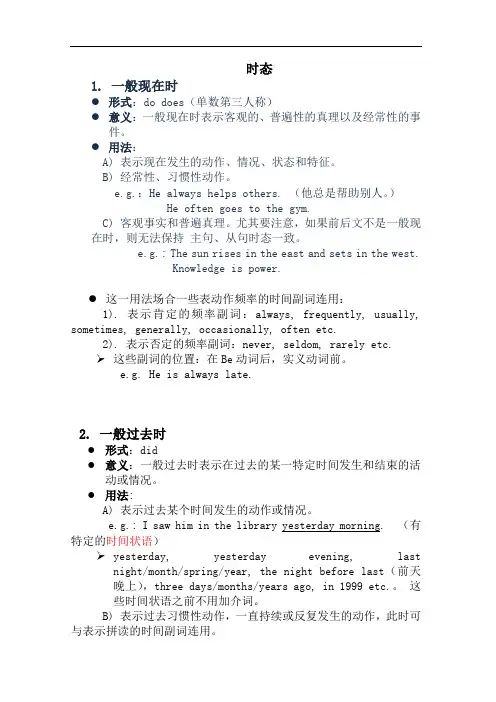
时态1. 一般现在时●形式:do does(单数第三人称)●意义:一般现在时表示客观的、普遍性的真理以及经常性的事件。
●用法:A) 表示现在发生的动作、情况、状态和特征。
B) 经常性、习惯性动作。
e.g.:He always helps others. (他总是帮助别人。
)He often goes to the gym.C) 客观事实和普遍真理。
尤其要注意,如果前后文不是一般现在时,则无法保持主句、从句时态一致。
e.g.: The sun rises in the east and sets in the west.Knowledge is power.●这一用法场合一些表动作频率的时间副词连用:1). 表示肯定的频率副词:always, frequently, usually, sometimes, generally, occasionally, often etc.2). 表示否定的频率副词:never, seldom, rarely etc.➢这些副词的位置:在Be动词后,实义动词前。
e.g. He is always late.2. 一般过去时●形式:did●意义:一般过去时表示在过去的某一特定时间发生和结束的活动或情况。
●用法:A) 表示过去某个时间发生的动作或情况。
e.g.: I saw him in the library yesterday morning. (有特定的时间状语)➢yesterday, yesterday evening, last night/month/spring/year, the night before last(前天晚上),three days/months/years ago, in 1999 etc.。
这些时间状语之前不用加介词。
B) 表示过去习惯性动作,一直持续或反复发生的动作,此时可与表示拼读的时间副词连用。
e.g.: I slept for eight hours last night. (表示在过去某一段时间内持续的动作,但这动作现在已经结束了)3. 一般将来时●形式:will/shall do或be going to do●意义:一般将来时表示在未来的某个时间将要发生的某个动作或状态。
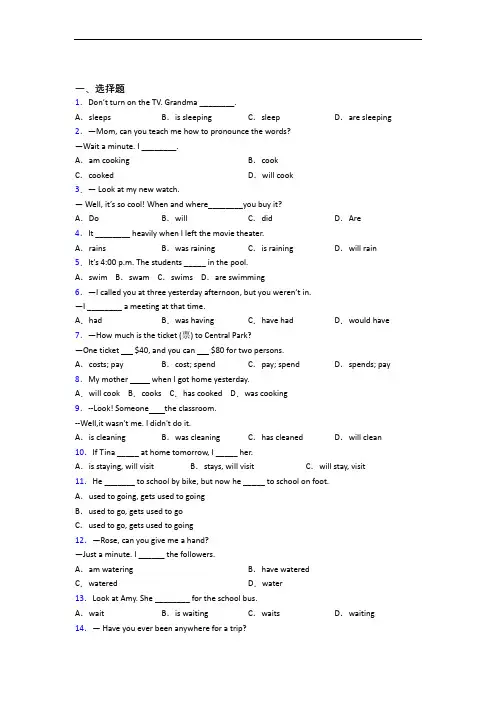
一、选择题1.Don’t turn on the TV. Grandma ________.A.sleeps B.is sleeping C.sleep D.are sleeping 2.—Mom, can you teach me how to pronounce the words?—Wait a minute. I ________.A.am cooking B.cookC.cooked D.will cook3.— Look at my new watch.—Well, it’s so cool! When and where________you buy it?A.Do B.will C.did D.Are4.It ________ heavily when I left the movie theater.A.rains B.was raining C.is raining D.will rain 5.It’s 4:00 p.m. The students _____ in the pool.A.swim B.swam C.swims D.are swimming6.—I called you at three yesterday afternoon, but you weren’t in.—I ________ a meeting at that time.A.had B.was having C.have had D.would have 7.—How much is the ticket (票) to Central Park?—One ticket $40, and you can $80 for two persons.A.costs; pay B.cost; spend C.pay; spend D.spends; pay 8.My mother when I got home yesterday.A.will cook B.cooks C.has cooked D.was cooking9.--Look! Someone the classroom.--Well,it wasn't me. I didn't do it.A.is cleaning B.was cleaning C.has cleaned D.will clean 10.If Tina _____ at home tomorrow, I _____ her.A.is staying, will visit B.stays, will visit C.will stay, visit 11.He _______ to school by bike, but now he _____ to school on foot.A.used to going, gets used to goingB.used to go, gets used to goC.used to go, gets used to going12.—Rose, can you give me a hand?—Just a minute. I ______ the followers.A.am watering B.have wateredC.watered D.water13.Look at Amy. She ________ for the school bus.A.wait B.is waiting C.waits D.waiting 14.— Have you ever been anywhere for a trip?— A trip? I ________ away from my hometown even once.A.went B.have gone C.have been D.have never been 15.The water ______ cool when I jumped into the pool for morning exercise.A.was felt B.is felt C.felt D.feels 16.While I_______ a detective story, someone_______ at the door.A.read, was knockingB.read, knockedC.was reading, knockedD.was reading, was knocking17.--What age did you leave home ?--I left home at 18. I ___your city for five yearsA.have gone to B.have been to C.have been in D.have come to 18.The film Operation Red Sea_____a lot of praise since its first show months ago. A.wins B.win C.will win D.has won 19.It’s 8 o’clock. The students _________ an English class.A.have B.having C.is having D.are having 20.—Did you hear the strange noise next door around 9 o’clock last night?— No, I ________my favourite film in my bedroom.A.watch B.watched C.am watching D.was watching 21.Don’t talk! The baby ________.A.sleeps B.is sleep C.sleeping D.is sleeping 22.— What do you use MP3 for?— I ________ it ________ to music.A.use; listen B.are listening; listeningC.use; to listen D.is listening; to listening23.My father was reading ________ I was sleeping.A.while B.when C.before D.after 24.Look! All my classmates ___________ on the playground.A.are running B.ran C.were running D.run25.—I can’t find Peter. Where is he?— He ______ tea in the living room.A.drinks B.drinking C.is drinking D.drink【参考答案】***试卷处理标记,请不要删除一、选择题1.B【解析】【分析】【详解】句意:别开电视,奶奶正在睡觉。
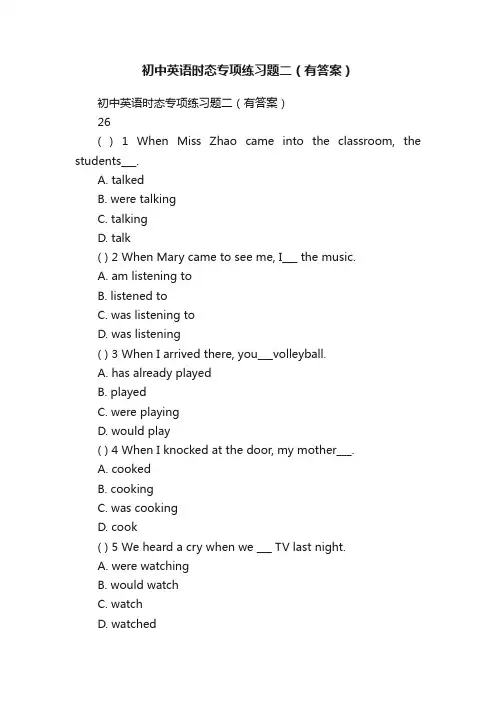
初中英语时态专项练习题二(有答案)初中英语时态专项练习题二(有答案)26( ) 1 When Miss Zhao came into the classroom, the students___.A. talkedB. were talkingC. talkingD. talk( ) 2 When Mary came to see me, I___ the music.A. am listening toB. listened toC. was listening toD. was listening( ) 3 When I arrived there, you___volleyball.A. has already playedB. playedC. were playingD. would play( ) 4 When I knocked at the door, my mother___.A. cookedB. cookingC. was cookingD. cook( ) 5 We heard a cry when we ___ TV last night.A. were watchingB. would watchC. watchD. watched27( ) 1 Mary was drawing a horse on the blackboard when I ___ in.A. have comeB. cameC. am comingD. come( ) 2 The little boy ___ when I came into the room.A. is drawingB. drawsC. has drawnD. was drawing( ) 3 I ___ the floor when my father came in.A. was sweepingB. sweptC. sweepingD. am sweeping( ) 4 They ___ a meeting when I saw them.A. hadB. have hadC. were havingD. are having( ) 5 -What ___ when I phoned you this morning?-I ___ my homework and was starting to take a bath.A. were you doing; had just finishedB. would you do; have just finishedC. are you doing; just finishedD. did you do; just finished28( ) 1 Look at the clouds. ___.A. It's going to rainB. It'll be rainingC. It will be rainedD. If 11 rain I( ) 2 Myfamily____to stay in London for some time.A. is goingB. are goingC. goD. are go( ) 3 There___ two English films next week.A. is going to beB. are going to haveC. will haveD. are going to be( ) 4 There is going to___ a volleyball match on our school playground. The match is going to___ at six this evening.A. have; beB. be; haveC. be; beD. have; have29( ) 1 -Are you busy this afternoon?-No. I___to watch a football match.A. am goingB. willC. shallD. can( ) 2 Who ___ help him to move the box away?A. areB. are going ,C. are going toD. is( ) 3 Where ____ buy a computer for your son?A. you areB. are goingC. you goD. are you going to30( ) 1 It is getting dark. I___.A. must be leavingB. must be leftC. will leavingD. was leaving( ) 2 Tell me who_,__ to our party tomorrow.A. is comingB. was comingC. comeD. have come( ) 3 Whom ___ you ___ to for help now?A. are; turningB. are; turnC. would; turnD. do; turning31( ) 1 Next year my little sister ____ ten years old.A. is to beB. is going to beC. shall beD. will be( ) 2 They have just decided that they ___ the job.A. have takenB. will takeC. would takeD. are taking( ) 3 She says that she___to Beijing next week.A. has goneB. will goC. goesD. go( ) 4 If he___at eight, we___, too.A. leave; doB. leaves; willC. will leave; willD. is leaving; are( ) 5 -Is this the last exam for this term?-Yes, but there___ another test three months from now.A. isB. wasC. will beD. has been( ) 6 You___ late for school again if you___ early.A. shall be; won't get upB. are; won't get upC. will be; don't get upD. have been; not get32( ) 1 Will you please ___ this rubber to Xiao Ling?A. to giveB. givingC. gaveD. give( ) 2 -____ I ____ the window?-Yes, please.A. Will; cleanB. Am; cleaningC. Do; cleanD. Shall; clean( ) 3 ___ you like to have dinner with us tonight?A. WouldB. DoC. AreD. Will33( ) 1 -I'm sorry, I forgot to past the card for you. -Never mind, I ___ post it tomorrow.A. am goingB. am going toC. will goD. go( ) 2 ___ you ___ a teacher when you grow up?A. Will; beB. Are; going to beC. Are; /D. Will; going to be,34( ) 1 I thought Class One ___ in the match.A. will winB. would winC. is going to winD. was going to win( ) 2 She didn't tell me whether she ___ back early or late.A. comesB. will comeC. is comingD. would come( ) 3 The students were told that they____ at the school gate at 2: 00 the following afternoon.A. metB. will meetC. were to meetD. were met35( ) 1 Last year the old man___ under the roof, enjoying the sunlight-A. sitsB. is sittingC. sitD. would sit( ) 2 We___ each other when we studied together.A. helpingB. are helpingC. would helpD. do help( ) 3 Though we pushed the car hard, the car___ away.A. wouldn't moveB. movedC. would moveD. doesn't move36( ) 1 ______ you ___ the novel that I lent you last week?A. Did; finishB. Have; finishedC. Are; finishedD. Do; finish ( ) 2 He ___ in our school for 20 years and he ___ here in 1977.A. has taught; cameB. has taught; has comeC. taught; cameD. has teached; has came( ) 3 They are late. The film ___ for five minutes.A. has begunB. has startedC. has been onD. began37( ) 1 A new school ___ in my hometown recently.A. is set upB. has been set upC. was set upD. has set up( ) 2 -Did your brother go to America last year?A. No he did never go thereB. No, he has never gone thereC. No, he never was thereD. No, he's never been there( ) 3 _____ the Great Wall?A. Have you ever gone toB. Are you ever going toC. Do you ever go toD. Have you ever been to( ) 4.I___ the book yet.A. haven't readB. hadn't readC. don't readD. am not reading ( ) 5 They left for Beijing last month and we ___ them ever since.A. don't hear fromB. haven't heard fromC. won't hear fromD. didn't hear from( ) 6 He says he___ the book several times already this year.A. had readB. has readC. will readD. is reading38( ) 1 He ___ the book a week ago, but I ___ it to the library.A. have lent; returnedB. have borrowed; returnC. borrowed; have returnedD. lent; have returned( ) 2 You can't use the computer. It___.A. was broken downB. is wrongC. is badD. has broken down ( ) 3 I'm sorry, I____your name.A. have forgottenB. forgotC. had forgottenD. forgotten39( ) 1 The old man ___ in this house since 1949.A. has livedB. had livedC. is livingD. lives( ) 2 I hope I ___ no mistake in my work so farA. makeB. am makingC. have madeD. was making( ) 3 The life of the people___ greatly in the past years.A. has changedB. have changedC. changedD. are changing( ) 4 Her grandpa___ for three years.A. has been deadB. has diedC. had been deadD. died40( ) 1 I ___ her only twice since last year.A. seeB. was seeingC. have seenD. saw( ) 2 Lucy ___ to Shanghai once.118 It's a Haidian top problemA. wentB. has goneC. has beenD. had been( ) 3 Judy___the Great Wall twice, and now she still ___to go there. A. went to; wanted B. goes to; wantsC. has gone to; wantsD. has been to; wants( ) 4 In the past five years. I___ English words.A. have learned three thousandB. learned three thousand ofC. had learned three thousandsD. learned thousands of( ) 5 He ___ there many times.A. has beenB. wentC. has been toD. has gone41( ) 1 -- you ___ your breakfast?-Yes, I have.-When ___ you ___ it?-Twenty minutes ago.A. Have; have; have; hadB. Did; have; did; haveC. Have; had; do; haveD. Have; had; did; have( ) 2 -___ your homework yet?-Not yet, I___it.A. Have you done; am doingB. Did you do; didC. Did you do; am doingD. Have you done; did( ) 3 -Where___ the recorder? I can't see it anywhere.-I ___ it right here half an hour ago. But now it is gone.A. did you put; have putB. have you put; putC. do you put; puttingD. did you put; have put42( ) 1 Mr Green ___ China for three years.A. has been toB. has come toC. has been inD. has arrived in( ) 2 Tom ___ London for two years.A. had leftB. has gone awayC. has been away fromD. had been away from( ) 3 How long ___ a Party member?A. have you beenB. are youC. have you becomeD. did you become 43( ) 1 My father isn't here now. He ___Shanghai. He ___ there twice.A. has gone; has beenB. has gone to; has been toC. has been to; has goneD. has gone to; has been( ) 2 -Hi! Bruce. I have't seen you for three weeks.-Hi! George. I___America.A. have gone toB. went to -C. have been toD. have been in( ) 3 My uncle___ London for five years. But he will be back next year.A. wentB. has been inC. has goneD. has gone to( ) 4 -Could I speak to Mrs Black, please?-Sorry, she ___ to the library.A. is goingB. has goneC. has beenD. will to( ) 5 Peter is young, but he___ many foreign countries.A. has been inB. has gone toC. went toD. has been to44( ) 1 ____ you ____ the book?A. Are; haveB. Have; gotC. Do; getD. Are; having( ) 2 ____ you ____ to know about the news?A. Do; mustB. Will; getC. Have; hadD. Do; have( ) 3 They___ finish the job by tomorrow.A. have gotB. have got toC. got toD. have45( ) 1 Before we got to the railway station, the train___ already.A. went outB. had goneC. has goneD. has arrived( ) 2 The film ___ when I ___ to the cinema.A. has begun; getB. had begun; gotC. has been on; getD. had been on; got( ) 3 The meeting____ for five minutes when I got there.A. had begunB. had been onC. has begunD. has been on( ) 4 -Let's hurry. The President is coming.-Oh, I was afraid that we___.A. already miss himB. had already missed himC. will miss him alreadyD. have already missed him( ) 5 When I___ to the cinema, the film___ for 5 minutes.A. got; had begunB. get; will beginC. got; had been onD. got; has been on( ) 6 By the end of last term, we___over two thousand new words.A. learnedB. have learnedC. will learnD. had learned初中英语时态专项练习题二参考答案26. 1-5 B C C C A 27. 1-5 B D A C A 28. 1-4 A B D C 29. 1-3 AC D 30. 1-3 A A A 31. 1-6 D B B B C C 32. 1-3 D D A 33. 1-2 C B34. 1-3 B D C 35. 1-3 D C A 36. 1-3 B A C 37. 1-6 B D D A B B 38. 1-3 C D A 39. 1-4 A C A A 40. 1-5 C C D A A 41. 1-3 D A B 42. 1-3 C C A 43. 1-5 D C D B D 44. 1-3 C D B 45. 1-6 B B B B C D 初中英语语法练习题一参考答案:1. 1 -4 C D A D2. 1-4 D B A C3. 1 -3 C C A4. 1 -3 A D A5. 1 -4 C B A C6. 1 -3 C B D初中英语语法练习题二key01-05 CAACB 06-10 CACCC 11-15 AABBD16-20 CABCB 21-25 ACCDA 26-30 BBCBD31-35 CBCAA 36-40 BAAAC 41-45 ACABC46-50 DCBAC 51-55 BCCCB 56-60 CCCBB61-65 BBBBA 66-70 BBCCC 71-75 DDABB76-80 DCABD 81-85 ACDAD 86-90 BDDCC91-95 CCCCA 96-98 CBB直接引语变间接引语练习题【参考答案】1.he, ate2.told, had, found, his3.she, had, taken4.rise, goes5.told, had, before6.had, there7.had, before 8.asked, if [whether], before 9.told, could 10.how, she, had11.where, I, had, those 12.if [whether], I, lived 13.told, to, stop 14.not, to, tell15. asked, if [whether], that。
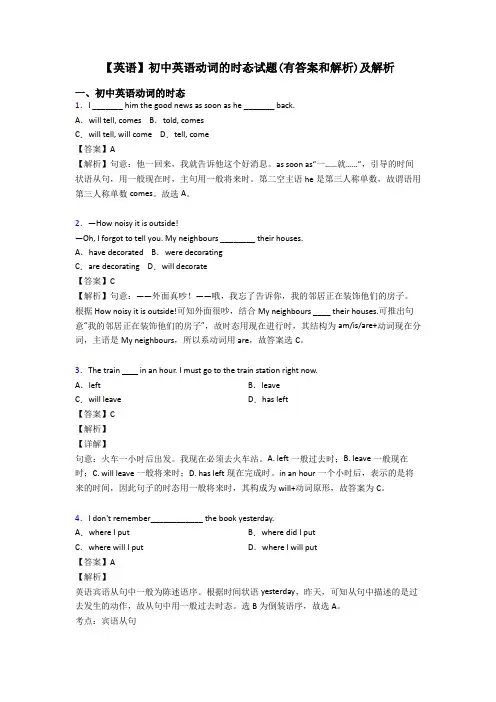
【英语】初中英语动词的时态试题(有答案和解析)及解析一、初中英语动词的时态1.I _______ him the good news as soon as he _______ back.A.will tell, comes B.told, comesC.will tell, will come D.tell, come【答案】A【解析】句意:他一回来,我就告诉他这个好消息。
as soon as“一……就……”,引导的时间状语从句,用一般现在时,主句用一般将来时。
第二空主语he是第三人称单数,故谓语用第三人称单数comes。
故选A。
2.—How noisy it is outside!—Oh, I forgot to tell you. My neighbours ________ their houses.A.have decorated B.were decoratingC.are decorating D.will decorate【答案】C【解析】句意:——外面真吵!——哦,我忘了告诉你,我的邻居正在装饰他们的房子。
根据How noisy it is outside!可知外面很吵,结合My neighbours ____ their houses.可推出句意“我的邻居正在装饰他们的房子”,故时态用现在进行时,其结构为am/is/are+动词现在分词,主语是My neighbours,所以系动词用are,故答案选C。
3.The train in an hour. I must go to the train station right now.A.left B.leaveC.will leave D.has left【答案】C【解析】【详解】句意:火车一小时后出发。
我现在必须去火车站。
A. left一般过去时;B. leave一般现在时;C. will leave一般将来时;D. has left现在完成时。
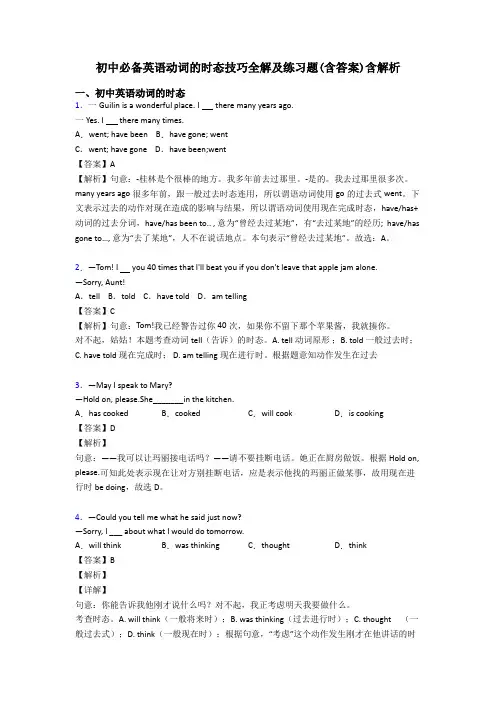
初中必备英语动词的时态技巧全解及练习题(含答案)含解析一、初中英语动词的时态1.一Guilin is a wonderful place. I there many years ago.一Yes. I there many times.A.went; have been B.have gone; wentC.went; have gone D.have been;went【答案】A【解析】句意:-桂林是个很棒的地方。
我多年前去过那里。
-是的。
我去过那里很多次。
many years ago很多年前,跟一般过去时态连用,所以谓语动词使用go的过去式went。
下文表示过去的动作对现在造成的影响与结果,所以谓语动词使用现在完成时态,have/has+动词的过去分词,have/has been to.. , 意为“曾经去过某地”,有“去过某地”的经历; have/has gone to…, 意为“去了某地”,人不在说话地点。
本句表示“曾经去过某地”。
故选:A。
2.―Tom! I you 40 times that I'll beat you if you don't leave that apple jam alone.―Sorry, Aunt!A.tell B.told C.have told D.am telling【答案】C【解析】句意:Tom!我已经警告过你40次,如果你不留下那个苹果酱,我就揍你。
对不起,姑姑!本题考查动词tell(告诉)的时态。
A. tell 动词原形;B. told 一般过去时;C. have told 现在完成时;D. am telling现在进行时。
根据题意知动作发生在过去3.—May I speak to Mary?—Hold on, please.She_______in the kitchen.A.has cooked B.cooked C.will cook D.is cooking【答案】D【解析】句意:——我可以让玛丽接电话吗?——请不要挂断电话。
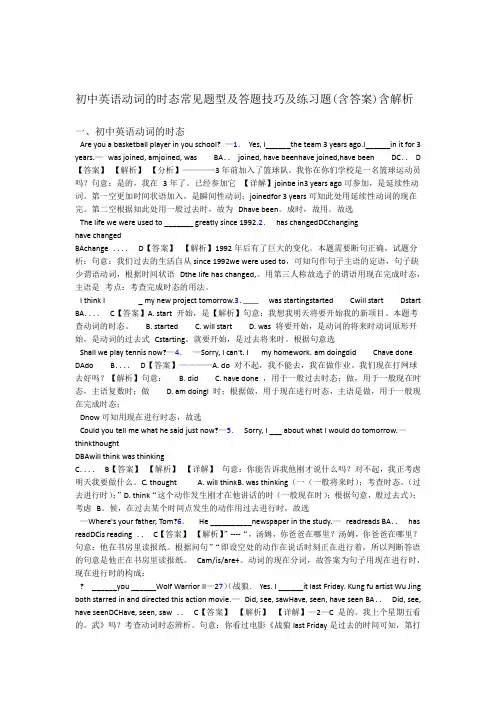
初中英语动词的时态常见题型及答题技巧及练习题(含答案)含解析一、初中英语动词的时态Are you a basketball player in you school? —1.Yes, I______the team 3 years ago.I______in it for 3 years.—was joined, amjoined, was BA..joined, have beenhave joined,have been DC..D 【答案】【解析】【分析】————3年前加入了篮球队。
我你在你们学校是一名篮球运动员吗?句意:是的,我在3年了。
已经参加它【详解】joinbe in3 years ago可参加,是延续性动词。
第一空更加时间状语加入,是瞬间性动词;joinedfor 3 years可知此处用延续性动词的现在完。
第二空根据知此处用一般过去时,故为Dhave been。
成时,故用。
故选The life we were used to _______ greatly since 1992.2.has changedDCchanginghave changedBAchange ....D【答案】【解析】1992年后有了巨大的变化。
本题需要断句正确,试题分析:句意:我们过去的生活自从since 1992we were used to,可知句作句子主语的定语,句子缺少谓语动词,根据时间状语Dthe life has changed,。
用第三人称故选子的谓语用现在完成时态,主语是考点:考查完成时态的用法。
I think I _ my new project tomorrow.3.was startingstarted Cwill start Dstart BA....C【答案】A. start 开始,是【解析】句意:我想我明天将要开始我的新项目。
本题考查动词的时态。
B. started C. will start D. was 将要开始,是动词的将来时动词原形开始,是动词的过去式Cstarting。
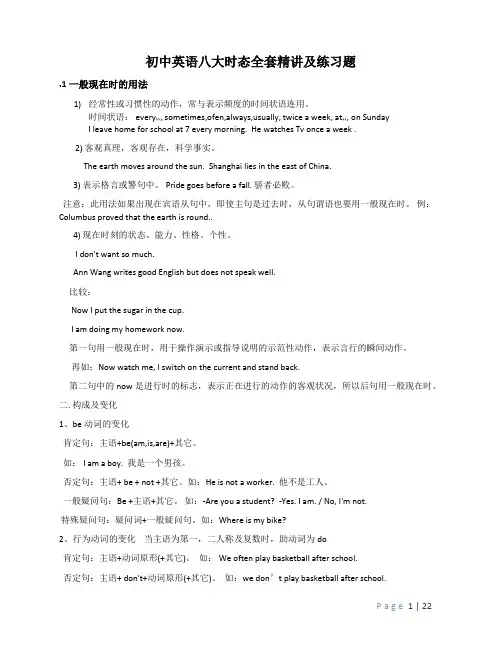
初中英语八大时态全套精讲及练习题.1 一般现在时的用法1)经常性或习惯性的动作,常与表示频度的时间状语连用。
时间状语: every…, sometimes,ofen,always,usually, twice a week, at…, on SundayI leave home for school at 7 every morning. He watches Tv once a week .2) 客观真理,客观存在,科学事实。
The earth moves around the sun. Shanghai lies in the east of China.3) 表示格言或警句中。
Pride goes before a fall. 骄者必败。
注意:此用法如果出现在宾语从句中,即使主句是过去时,从句谓语也要用一般现在时。
例:Columbus proved that the earth is round..4) 现在时刻的状态、能力、性格、个性。
I don't want so much.Ann Wang writes good English but does not speak well.比较:Now I put the sugar in the cup.I am doing my homework now.第一句用一般现在时,用于操作演示或指导说明的示范性动作,表示言行的瞬间动作。
再如:Now watch me, I switch on the current and stand back.第二句中的now是进行时的标志,表示正在进行的动作的客观状况,所以后句用一般现在时。
二. 构成及变化1、be动词的变化肯定句:主语+be(am,is,are)+其它。
如: I am a boy. 我是一个男孩。
否定句:主语+ be + not +其它。
如:He is not a worker. 他不是工人。
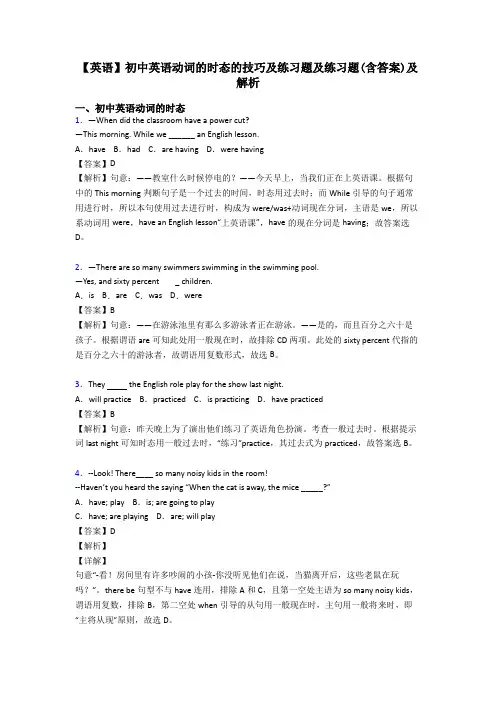
【英语】初中英语动词的时态的技巧及练习题及练习题(含答案)及解析一、初中英语动词的时态1.—When did the classroom have a power cut?—This morning. While we ______ an English lesson.A.have B.had C.are having D.were having【答案】D【解析】句意:——教室什么时候停电的?——今天早上,当我们正在上英语课。
根据句中的This morning判断句子是一个过去的时间,时态用过去时;而While引导的句子通常用进行时,所以本句使用过去进行时,构成为were/was+动词现在分词,主语是we,所以系动词用were,have an English lesson“上英语课”,have的现在分词是having;故答案选D。
2.—There are so many swimmers swimming in the swimming pool.—Yes, and sixty percent _ children.A.is B.are C.was D.were【答案】B【解析】句意:——在游泳池里有那么多游泳者正在游泳。
——是的,而且百分之六十是孩子。
根据谓语are可知此处用一般现在时,故排除CD两项。
此处的sixty percent代指的是百分之六十的游泳者,故谓语用复数形式,故选B。
3.They the English role play for the show last night.A.will practice B.practiced C.is practicing D.have practiced【答案】B【解析】句意:昨天晚上为了演出他们练习了英语角色扮演。
考查一般过去时。
根据提示词last night可知时态用一般过去时,“练习”practice,其过去式为practiced,故答案选B。
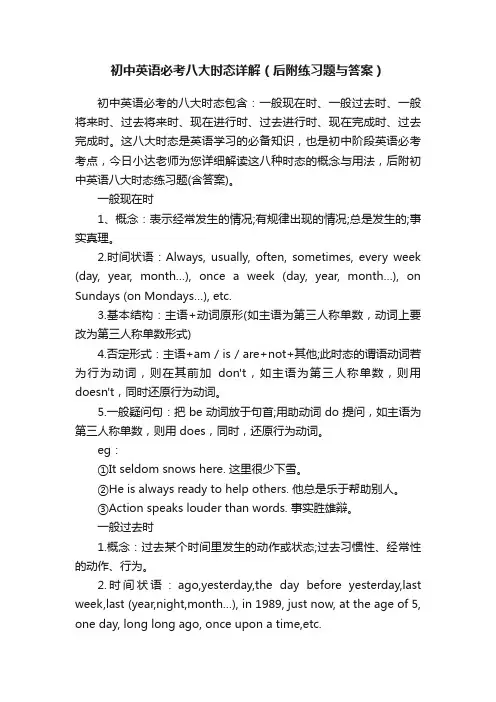
初中英语必考八大时态详解(后附练习题与答案)初中英语必考的八大时态包含:一般现在时、一般过去时、一般将来时、过去将来时、现在进行时、过去进行时、现在完成时、过去完成时。
这八大时态是英语学习的必备知识,也是初中阶段英语必考考点,今日小达老师为您详细解读这八种时态的概念与用法,后附初中英语八大时态练习题(含答案)。
一般现在时1、概念:表示经常发生的情况;有规律出现的情况;总是发生的;事实真理。
2.时间状语:Always, usually, often, sometimes, every week (day, year, month…), once a week (day, year, month…), on Sundays (on Mondays…), etc.3.基本结构:主语+动词原形(如主语为第三人称单数,动词上要改为第三人称单数形式)4.否定形式:主语+am / is / are+not+其他;此时态的谓语动词若为行为动词,则在其前加don't,如主语为第三人称单数,则用doesn't,同时还原行为动词。
5.一般疑问句:把 be 动词放于句首;用助动词 do 提问,如主语为第三人称单数,则用 does,同时,还原行为动词。
eg:①It seldom snows here. 这里很少下雪。
②He is always ready to help others. 他总是乐于帮助别人。
③Action speaks louder than words. 事实胜雄辩。
一般过去时1.概念:过去某个时间里发生的动作或状态;过去习惯性、经常性的动作、行为。
2.时间状语:ago,yesterday,the day before yesterday,last week,last (year,night,month…), in 1989, just now, at the age of 5, one day, long long ago, once upon a time,etc.3.基本结构:主语+动词的过去式或 be 的过去式+名词4.否定形式:主语+was / were+not+其他;在行为动词前加didn't,同时还原行为动词。
一、选择题1.It’s _______today.I think it’s going to________.A.cloud,rainB.cloudy,rainingC.cloudy,rainD.cloudy,rainy2.Mr Hua ________ to Japan. He’ll come back in two weeks.A.goes B.went C.has gone D.will go 3.—Listen!Who in the music room?—It must be Sally. She there every day.A.sings, sings B.is singing, sings C.sings, is singing 4.—Surprise! Cindy is singing in the concert.—But she ______.A.will refuse B.refusedC.refuses D.has refuse5.Miss Brown, we ______ cleaning our classroom. Can we go home now?A.finish B.finishingC.are finished D.have finished6.—Mom, can you teach me how to pronounce the words?—Wait a minute. I ________.A.am cooking B.cookC.cooked D.will cook7.— Look at my new watch.—Well, it’s so cool! When and where________you buy it?A.Do B.will C.did D.Are 8.—________ a remake (翻拍) of the famous Disney movie Lion King in July, 2019.— Really? I can't wait to see it.A.There will have B.There is going to have C.There will be 9.—I called you at three yesterday afterno on, but you weren’t in.—I ________ a meeting at that time.A.had B.was having C.have had D.would have 10.—I'm sorry. There was too much traffic on the road.—Never mind. The meeting________for only 5 minutes.A.has begun B.has stopped C.has been on 11.They the English role play for the show last night.A.will practice B.practiced C.is practicing D.have practiced12.—How long have you________?—For 10 years, we got married in 2005.A.married B.got married C.been married D.were married 13.—Did you see a man in black pass by just now?—No, sir. I a newspaper.A.read B.was reading C.would read D.am reading 14.Though the number of family cars ________ growing in most cities, the bicycle is still a popular way of going to school or work.A.are B.is C.were D.was 15.Look at Amy. She ________ for the school bus.A.wait B.is waiting C.waits D.waiting 16.Don’t turn on the TV. Grandma ________.A.sleeps B.is sleeping C.sleep D.are sleeping 17.The water ______ cool when I jumped into the pool for morning exercise.A.was felt B.is felt C.felt D.feels 18.While I_______ a detective story, someone_______ at the door.A.read, was knockingB.read, knockedC.was reading, knockedD.was reading, was knocking19.---Where have you been recently?---I _______ in Hangzhou on business for a week last month.A.have been B.had gone C.had been D.was 20.— Mum, where is Dad?— He _________ flowers in the garden now.A.planted B.plants C.will plant D.is planting 21.—How did the accident happen?—You know, it was difficult to see the road clearly because it________.A.was raining B.has rained C.is raining D.will rain 22.With a book in his hand, the boy ________ in bed.A.lie B.lied C.lay D.lying 23.Sandy likes ________ TV. She ________ TV every day.A.watching; watching B.watch; watchesC.to watch; is watching D.watching; watches24.— What do you use MP3 for?— I ________ it ________ to music.A.use; listen B.are listening; listeningC.use; to listen D.is listening; to listening25.— Could you please tell me yesterday?— In the bookshop nearby.A.Where you bought the book B.Where you buy the bookC.Where did you buy the book D.Where do you buy the book【参考答案】***试卷处理标记,请不要删除一、选择题1.C解析:C【解析】【详解】句意:今天阴天,我想要下雨了。
【英语】英语动词的时态解题技巧分析及练习题(含答案)含解析一、初中英语动词的时态1.— What do you think of the young lady?— She is hard-working. She ________ all her effort into her work before she got ill.A.has put B.put C.had put D.would put【答案】C【解析】试题分析:句意:你认为这位小姐怎样?她很勤奋。
她生病前把她所有的精力都投入到她的工作中。
根据时间状语从句before she got ill.可知主句该用过去完成时态,所以选C。
考点:考查动词时态。
2.Ken, can you turn down the music a little? I _________ to study for my test.A.am trying B.try C.tried D.have tried【答案】A【解析】句意:Ken,你能把音乐调小一点吗?我正在设法为我的考试学习。
根据语境可知用现在进行时,其结构是be doing的形式,短语try to do sth.表示设法做某事。
根据题意,故选A。
现在进行时的基本结构1肯定式:am/is/are+doing(现在分词)否定式:am/is/are not +doing(现在分词)一般疑问式:Am/Is/Are + 主语 +doing(现在分词)+ 其他特殊疑问式:特殊疑问词+一般疑问式They’re having a meeting now. 他们现在正在开会。
They aren't having a meeting now. 他们现在没有在开会。
Are they having a meeting now? 他们现在正在开会吗?What are they doing now? 他们现在正在做什么?3.—I’m not sure if my sister Vivian ____________ the driving test next week.— Please let me know if she ____________ it.A.has passed; passes B.passed ; will pass C.passes; has passed D.will pass; passes 【答案】D【解析】句意:-我不确定我姐妹Vivian下周是否可以通过驾驶考试。
初中英语时态练习(1)1.I will tell him as soon as he _____ backA. comeB. comesC. will comeD. came2. Mary _____ on shoes when she ____ them.A. tries…buysB. tries… buiesC. trys… buysD. trys… buies3. The girl often ______ cold when she ______.A. cathcs…danc esB. catches… dancesC. catchs…danceesD. catches… dancee4. _____ he ____ himself there? No, I don't think so.A. Do…enjoyB. Does… enjoiesC. Does… enjoysD. Does…enjoy5. _____ your teacher ____ from them very often? Certainly.A. Do…hearB. Does…hearC. Do… receiveD. receive6. _____ your mother _____ some cleaning on Sundays?A. Does…doesB. Do…doesC. Does…doD. Do… do7. _____ Tom _____to work hard to help his family ? Yes, he _____.A. Has… x…doesB. Has…x…doesC. Does…has…hasD. Does… have…does8. Which teacher _____ lessons to you every day ?A. does …givesB. does… giveC. do… giveD. gives9. Smith does not go fishing on weekdays, ____? _____ , he does.A. does he…NoB. does he…YesC. doesn't he…NoD. doesn't he…Yes10.Mr Black often _____ fishing on Sundays, _____ he ?A. goes…doesn'tB. goes…isn'tC. doesn't go…doesD. doesn't go…is11.He usually _____ TV on Sunday evening.A. watchB. watchesC. watchingD. is watching12. We'll go to play with snow if it ______ tomorrow.A. snowB. snowsC. will snowD. snowed13. Neither I nor he ______ French.A. speakB. doesn't speakC. speaksD. doesn't speak14. Nobody ______ how to run this machines.A . know B. have known C. knows D. is knowing15. The Young Pioneer _____ water for the old man every day.A. carryB. bringC. takesD. carries16. Some are ______ in the river and some are ______ games.A. swimming… playingB. swimming…plaiingC. swimming… I playingD. swimming…plaing17. Look ! The boy students are _____ football while the girls are _____ .A. playing… danceB. playing… dancingC. play… dancingD. play… dance18. He _____ to do his lessons at eight every evening.A. is beginningB. is beginningC. beginD. begins19. _____ he _____ on well with his friends this term ?A. Does…getsB. Does…getC. Is…gettingD. Is…geting20. Mr Smith _____ short stories, but he ____ a TV play these days.A. is writing…is writingB. is writing… writesC. writes… is writingD. writes… writes 参考答案:1—5 BABDB 6—10 CDDBA 11—15 BBCCD 16—20 CBDCC初中英语时态练习(2)21. I _____ to the cinema. I ______ there every Sunday.A. go…goB. am going… goC. go… am goingD. am going…am going22. Look, they______ a good time, ____ they ?A. have…doB. have…don'tC. are having…areD. are having… aren't23. You ______ about the future now, ______ you ?A. don't think…don'tB. aren't thinking… aren'tC. don't think… doD. aren't thinking… are24. She always ______ something whenever she ______.A .s tudied…played B. studied…plaiedC.. studied…plaiedD. studied… played25. He often _____ late in the forest. It _____ me very much.,A. stayed…worriedB. staied… worriedC. stayed…worryedD. staied… worried26. I ______that the boy _____ with no tears in his eyes.A. noticed… cryedB. noticed… criedC. noticed…criedD. noticed… cryed27. We _____the floor and _____ all the windows.A. mopped… cleannedB. moped… cleanedC. mopped…cleanedD. moped… cleaned28. When I _____ the Children's Palace, the children _____ with joy.A. visited… jumppedB. visited… jumpedC. visited… jumpedD. visited… jumpped29. ______ a sports meet last Sunday ? Yes , they ______.A. Did they have… didB. Did they have… hadC. Had they... had D. Had they (i)30. ____ you _____out for a walk after supper ? Yes, I ______.A. Did…went…wentB. Did… go… wentC. Did... went... did D. Did... go (i)31. _____ Jack _____ on with his work or ______ to have a rest?A. Did… went… stoppedB. Did… go… stopC. Did… went… stopD. Did… go… stopped32. You gave them a talk two days ago, _____you ? Yes, I ______.A. did… didB. did… gaveC. didn't… didD. didn't… gave33. ____ your brother _____ a letter to ? My father.A. Who… wroteB. What…wroteC. Who did…writeD. What did… write34. They _____ about the TV news then in the sitting-room. They often ____ such talksA. talked…hadB. talk…haveC. were talking…hadD. are talking…have35. He ______ some cooking at that time, so _____ me.A. did… heardB. did… didn't hearC. was doing… heardD. was doing… didn't hear36. " _____ you angry then?" "They_ too much noise.”A. Are…were makingB. Were…were makingC. Are…madeD. Were… made37. This time yesterday Jack _____ his, bike. He _____ TV.A. repaired… didn't watchB. was repairing… watchedC. repa ired… watchedD. was repairing… wasn't watching38. We _____ for Tom at ten last Sunday. He often kept us ______.A. were waiting… waitingB. were waiting… waitC. waited… waitingD. waited… wait39. When you _____ at the door, I _____ some washing.A. k nocked… didB. was knocking… didC. knocked… was doingD. knock… am doing40. The boy_____ English on the radio when I _____ his door.A. learned… was openingB. was learning… openedC. learned… openedD. is learning… open参考答案:21-25 BDDDA 26—30 BCBAD 31—35 BCCCD 36—40 BDACB初中英语时态练习(3)41. When they______ through the forest, a bear _____ at them.A. walked… was comingB. were walking… cameC. were talking… comesD. walk… is coming42. A young man _____ her while she _____ her work .A. watched… was finishingB. was watching… finishedC. watched… finishedD. was watching… was finishing43. While mother _____ some washing, I ______ a kite for Kack.A. did… madeB. was doing… madeC. was doing… was makingD. did… was ma king44. I _____ myself French from 7 to 9 yesterday morning. I _____ to work.A. was teaching… didn't goB. taught… didn't goC. was teaching… wentD. taught… went45. He _____ a model plane when I came to see him.A. makesB. is makingC. was makingD. made46. I ______ a letter at nine last night.A. is writingB. was writingC. wroteD. is writing47. The teacher_____ (give) us a history lesson when Tom walked into the classroom.A. gaveB. is givingC. was givenD. was giving48. There will be a football match in two days, that is _______.A. last SundayB. next SundayC. every SundayD. this Sunday49. We ______ class meeting this November.A. hadB. haveC. will haveD. are having50. He ______ in his garden every morning next year.A. will workB. worksC. workedD. is working51. Be careful. The train ______.A. will comeB.C. comesD. is coming52. Look at those clouds. It _____ soon, I'm afraid.A. is going to rainB. is rainingC. will rainD. won't rain53. The radio says it ______ the day after tomorrow.A. is going to snowB. is snowingC. will snowD. snows54. _____ he _____ some shopping tomorrow afternoon ?A. Will…doesB. is going to doC. is…doingD. Shall… do55. What day _____ it ______ tomorrow ? Wednesday.A. is… going to beB. will…beC. shall…beD. does…be56. The boy _______ sixteen years old next year.A. is going to beB. is growing to beC. will beD. is57. _____ you ____ me up at six, please ?A. Are…going to wakeB. Are…wakingC. Will…wakeD. Do…wake58. If he ______ to college, he _____ a lot more.A. will go…will learnB. will go…is going to learnC. is going… is going to learnD. goes… will learn59. When she _____ next time ,l ______ her everything.A. is going to come…shall tellB. will come…shall tellC. comes…will tellD. come…will tell60. What day ____ it ____ tomorrow ? It ____Tuesday.A. is…going to be… isB. will…be…willC. is…going to be…is goingD. will be…will be参考答案:41-45 BDCAC 46—50 BDDCA 51—55 DACBB 56—60 CCDCD初中英语时态练习(4)61. She _____that she _____ her best to help them the next term.A. says…will doB. said…will doC. said… would doD. says…would do62. People _____ that the Smiths _____ for a holiday next week.A. say… will goB. said… will goC. said… would goD. say…would go63. Nobody _____ us that he _____ even stricter with usA. tell…will beB. tells…would beC. told…will beD. told…would be64. Please _____ him that we _____ able to help him.A. tell…will beB. tells… would beC. told…will beD. told… would be65. Jack _____ that they _____ surprised to see it this Friday.A. know… would beB. knows… will beC. knew… would beD. knew… will be66. I _____to know if Mary_____ by train that afternoon.A. want… would goB. want… will goC. wanted… would goD. wanted… will go67. _____ he _____ that they _____ home tomorrow?A. Does… learn… would goB. Does… learn… will goC. Did… learn… would goD. Did… learn… will go68. We _____ that they _____ a sports meet tomorrow.A. learn… would haveB. have learned… would haveC. learn… will haveD. have learned… will have69. ____ you _____ that he _____ his lost son one day ?A. Do…think…will findB. Do…thought…would findC. Did…think…will findD. Did…thought…would find70. I _____ that you _____ good care of her that day.A. thought…will takeB. thought…would takeC. think… will take B. think… would take71. The visitors _____ where they _____ a short test.A. ask… would takeB. ask… will takeC. asked… would takeD. asked… can take72. John ____ sure that he ____ good at chemistry soon.A. be… will beB. is, would beC. was… will beD. was… would be73. She ____ ill so she ____ able to go skating the next day.A. is… won't beB. is… wouldn't beC. was… won' beD. was… wouldn't be74. He _____ the thief to the police when he _____ the man again.A. would take… would meetB. would take…metC. will take… will meetD. will take… meet75. Mother ____ me a new coat yesterday, I _____ it on. It fits me well.A. has made…have triedB. made…have triedC. has made…triedD. made…tried76. " He ____ to draw horses already ."" When ____he ?”. " Last year. "A. learned...has B. learned...did C. has learned...has D. has learned (i)77. Tom ____ up into the tree. Look, he _____ high up there !A. has got… isB. has climbed… wasC. got… wasD. climbed… is78. _____you _____ the text yet ? Yes, we _____ it two hours ago.A. Did…copy…didB. Have… copied…haveC. Have… copied… didD. Did …copy…had79. "Why she angry?" "Because he _____ at he just now.A. did… get, shoutedB. has…got…shoutedC. did… get… has shoutedD. has…got…has shouted80. _____ you ______ the film before ? Where ____ you _____ it ?A. Have… seen… did… seeB. Did…see…die…watchC. Have…seen… have… seenD. Did…see…have…seen参考答案:61-65 CADAB 66—70 CBDAB 71—75 CDDBB 76—80 DACBA初中英语时态练习(5)81. You _____ me waiting for two hours. I _____ for you since five.A. Kept…waitedB. have kept…waitedC. kept…have waitedD. have kept…have waite d82. Where _____John _____? To the library. He _____ there for an hour.A. has… been … has goneB. has…gone…has beenC. did… go… wentD. did…be…went83. _____ the baby still _____ ? No, it ______ crying.A. Has… cried… has stoppedB. Is…crying…stoppedC. Did… cry… stoppedD. Is…crying…has stopped84. I _____ the way. I ______ here for quite many years.A. knew... have lived B. knew (iv)C. know... have lived D. know (iv)85. _____ you ever _____America ? Yes, I have.A. Have… gone toB. Have… gone inC. Have… been toD. Have… been in86. My brother _______ college for over three years.A. has gone toB. has been toC. has been inD. has been for87. He _____ the Army by the end of 1992. He ____ in the army since then.A. joined…isB. has joined…has beenC. had joined…isD. has joined… has been88. By the time I _____ back they ____ up ten metres.A. came…have climbedB. came…had climbedC. come…have climbedD. had come…climbed89. Jack ____ over five lessons by seven o'clock. Then he____ a test.A. went…tookB. went…had takenC. had gone…tookD. had gone…had taken90. We _____ out by that time that he ____ a thief for a long time.A. had found…had beenB. had found…wasC. found…had beenD. found…was91. Before the new _____ him, he ____ to know about it.A. reaches… has gotB. reached…had gotC. reached… gotD. had reached…got92. I _____ him a second letter before I _____ from him.A. wrote… heardB. wrote… had heardC. had written… heardD. have written… hear93. We _____ in a good harvest because we ______ enough rain.A. didn't get… had hadB. got… had hadC. had got… had badD. got… hadn't had94. They ____for five hours when they ____ in New York.A. flew…arrivedB. had flown…had arrivedC. flew…had arrivedD. had flown…arrived95. She ____ that ____ it for two days by that day.A. says…has rainedB. says…had rainedC. said… had rainedD. said…rained96. John _____ there since the year before, so he ____ them.A. had worked…knewB. had worked….had knownC. worked…knewD. worked…had known'97. He _____ angry because he _____ for a long time.A. had got…had waitedB. got…waitedC. had got…waitedD. got…had waited98. Paper _____ first invented in China.A. isB. areC. wasD. were99. The Greens _____ China for five years.A. has been inB. have been inC. went toD. has gone to100.There _____ an eraser under the desk. Is it yours ?A. isB. hasC. wasD. had参考答案:81-85 DBDCC 86—90 DDBCA 91—95 BCBDC 96-100 ADCBA。
(英语)初中英语动词的时态解题技巧分析及练习题(含答案)一、初中英语动词的时态1.In the past few years, many schools ______ the ways of doing morning exercises. A.change B.changes C.will change D.have changed【答案】D【解析】试题分析:句意:在过去的几年里,很多学校已改变了做早操的方式。
根据时间状语In the past few years可知,本题用现在完成时。
故选D。
2.We a few museums while we were in London.A.visit B.visitedC.have visited D.are visiting【答案】B【解析】句意:当我在伦敦时,我参观了几个博物馆。
A. visit 参观,用于一般现在时态,主语复数时; B. visited 参观,用于一般过去时态; C. have visited 参观,用于一般现在完成时态;D. are visiting 参观,用于现在进行时态,主语复数时;根据 while we were in London.可知主句用过去时态;故选B3.—Could you tell me what he said just now?—Sorry, I ___ about what I would do tomorrow.A.will think B.was thinking C.thought D.think【答案】B【解析】【详解】句意:你能告诉我他刚才说什么吗?对不起,我正考虑明天我要做什么。
考查时态。
A. will think(一般将来时);B. was thinking(过去进行时);C. thought (一般过去式);D. think(一般现在时);根据句意,“考虑”这个动作发生刚才在他讲话的时候,在过去某个时间点发生的动作用过去进行时,故选B。
初中英语语法:八种时态详解与练习一.概念:英语中表示不同时间发生的动作或存在的状态,需用不同的动词形式表示,这种不同的动词形式称为时态。
二.种类:(基本时态)一般现在时一般过去时现在进行时过去进行时一般将来时过去将来时现在完成时过去完成时一般现在时一、概念:经常、反复发生的动作或行为及现在的某种状况.二、常搭配的时间状语:always, usually, often, sometimes, every week (day, year, month…), once a week,on Sundays, etc。
三、基本结构①be动词(is,am,are);②行为动词(主语是第三人称单数时谓语动词要加s或es外)否定形式:①am/is/are+not;②此时态的谓语动词若为行为动词,则在其前加don't,如主语为第三人称单数,则用doesn't,同时还原行为动词.一般疑问句:①把be动词放于句首;②用助动词do提问,如主语为第三人称单数,则用does,同时,还原行为动词。
例句:I go to school at 6 every morning. 每天早上我七点去上学。
Summer follows spring. 春天之后是夏天。
I learned that the earth goes around the sun when I was in primary school。
我在小学就学过地球是围绕太阳转的。
Pride goes before a fall。
骄者必败。
四、基本用法:1)描述当前时间内经常出现、反复发生的动作或存在的状态。
在这种情景中,句子常带有表示频率的时间状语:always , everyday , often , once a week (month , year , etc.), sometimes , seldom , usually等等,以表示句中的动作或状态是习惯性的、经常性的。
一、选择题1.— How ________ your trip to Australia?—Great. I’ll go there again next year.A.was B.is C.are D.were 2.We’re not sure _______ there’ll be _______ or not tomorrow.A.if; rains B.if; rainy C.whether; raining D.whether; rain 3.— Where can I find Jack?— He __________ to the post office.A.goes B.has gone C.has been D.will go 4.— How about going for a drive, Mike?— One moment, please! I __________ cleaning our room soon.A.will finish B.have finished C.finish D.finishes 5.—Mom, can you teach me how to pronounce the words?—Wait a minute. I ________.A.am cooking B.cookC.cooked D.will cook6.My mother _____ dinner when I got home yesterday.A.has cooked B.was cooking C.will cook D.cooks 7.Which of the following is right?A.He is used to live there.B.My main job is spreading the message about protecting the environment.C.I have borrowed the book from the library for two weeks.D.Kids under 18 are not allowed to drive.8.—Have you written a litter to your brother?—Yes, I have. I________one last Sunday.A.was writing B.wrote C.have written9.Alice always________her notebooks. She is not tidy.A.lose B.lost C.loses D.found 10.—How much is the ticket (票) to Central Park?—One ticket $40, and you can $80 for two persons.A.costs; pay B.cost; spend C.pay; spend D.spends; pay 11.Jack ______ a good rest as soon as he finishes the exam.A.has B.had C.is having D.will have12.My grandfather ________ live in the countryside, but now he ________ living in the city. A.used to; used to B.was used to; gets used toC.used to; is used to D.was used to; used to13.He to the zoo yesterday.A.goes B.go C.goed D.went14.—I can’t stand such loud music!— Sorry, I __________ it off.A.have turned B.turn C.turned D.will turn 15.Look at Amy. She ________ for the school bus.A.wait B.is waiting C.waits D.waiting 16.The water ______ cool when I jumped into the pool for morning exercise.A.was felt B.is felt C.felt D.feels 17.The film Operation Red Sea_____a lot of praise since its first show months ago. A.wins B.win C.will win D.has won 18.—Did you hear the strange noise next door around 9 o’clock last night?— No, I ________my favourite film in my bedroom.A.watch B.watched C.am watching D.was watching 19.—How did the accident happen?—You know, it was difficult to see the road clearly because it________.A.was raining B.has rained C.is raining D.will rain 20.Sandy likes ________ TV. She ________ TV every day.A.watching; watching B.watch; watchesC.to watch; is watching D.watching; watches21.Could you please turn down your music? I________.A.work B.works C.am working D.worked 22.If it _________rain tomorrow,I will ride to school with you.A.didn’t B.doesn’t C.won’t D.don’t 23.—Do you still play the piano?—Oh, no. I ________it since last year.A.did n’t play B.haven’t played C.don’t play 24.Look! All my classmates ___________ on the playground.A.are running B.ran C.were running D.run 25.He _______ to school by bike, but now he _____ to school on foot.A.used to going, gets used to goingB.used to go, gets used to goC.used to go, gets used to going【参考答案】***试卷处理标记,请不要删除一、选择题1.A解析:A【解析】【分析】【详解】句意:——你的澳大利亚之旅怎么样?——非常好。
巧解初中英语时态试题在初中阶段,学过的英语时态主要有“一般现在时、一般过去时、一般将来时、现在进行时、过去进行时、现在完成时、过去完成时、现在完成进行时”等八种时态。
在中考英语试题中,除了“过去完成时”和“现在完成进行时”出现的频率稍低外,其他时态都是“常客”。
解答时态题,要以“寻找时间信息”作为突破口。
一、根据时态与时间的“对应关系”解题英语句子的时态,大部分是依据明确的时间状语来决定的。
因此,解题时要注意运用时态与时间的“对应关系”。
如:◆句中有yesterday, last night/week/month/year/century, two days ago, the other day, whenhe was…时,句子或主句的时态用“一般过去时”。
◆句中有this time yesterday, at eight yesterday morning, at that time, from two to five yesterday afternoon, when I walked in the street时,句子或主句的时态用“过去进行时”。
◆句中有tomorrow, this month, next week, “in+段时间”,for another one hour, in the future, when he comes等时,句子或主句的时态用“一般将来时”。
◆句中有already, yet, for three years, over the years, so far, for a long time, in the past/last few years, since 1995, since ...ago, since last…,since she left here等“段时I'7”状语时,句子或主句的时态用“现在完成时”。
【中考真题】1.-Did you do anything interesting last Sunday?-Not really. I just at home.(2017年昆明卷)A. stayB. stayedC. will stayD. am staying2.Some exchange students with their host families this time yesterday.(2017年上海卷)A. are chattingB. will chatC. were chattingD. have chatted3.-Did you see Mr White just now?-Yes. He his car when I met him.(2017年营口卷)1A. parkedB. was parkingC. is parkingD. parks4. We TV from seven to nine last night.(2017年武威卷)A. were watchingB. will watchC. watchedD. watch5.-Hey, Kate. 1 called you at 6: 30 yesterday afternoon, but you didn't answer.-Oh, sorry. I at that time.(2017年怀化卷)A. am doing the dishesB. do the dishesC. was doing the dishes6.-I called you just now, but nobody answered.-Oh, I when the bell rang.(2017年恩施卷)A. am taking a showerB. was taking a showerC. took a shower7.-Have you set out?-Yes, we have. We in two hours.(2017年辽阳卷)A. arriveB. arrivedC. will arriveD. have arrived8. With the development of science and technology, robot cooks in our families in the future.(2017年泰安卷)A. appearB. appearedC. will appearD. is appearing9.-Hello, John. This is Mike. What are you doing now?2-I'm watching a football match. It started at 7: 30 pm. and it on for another one hour.(2017年长沙卷)A. has beenB. wasC. will be10. I am surprised at the new look of my hometown, for it a lot over the years. (2017年安徽卷)A. changedB. changesC. will changeD. has changed【答案与解析】1.B。
时间状语是last Sunday,因此句子的谓语用一般过去时。
2.C。
时间状语是this time yesterday,因此句子的谓语用过去进行时。
3.B。
时间状语是从句when I met him,因此主句的谓语用过去进行时。
4.A。
时间状语是from seven to nine last night,因此句子的谓语用过去进行时。
5.C。
时间状语是at that time,因此句子的谓语用过去进行时。
6.B。
时间状语是从句when the bell rang,因此句子的谓语用过去进行时。
7.C。
时间状语是这个从句,因此句子的谓语用一般将来时。
8.C。
时间状语是in the future,因此句子的谓语用一般将来时。
9.C。
时间状语是for another one hour,因此句子的谓语用一般将来时。
10. D。
时间状语是over the years,因此句子的谓语用现在完成时。
二、根据从句的“特定时态表示法”解题在if, unless, as long as等引导的条件状语从句中,其谓语用一般现在时表示一般将来时的概念;在when, before, until, as soon as等引导的时间状语从句中,其谓语用一般现在时表示一般将来时的概念。
也就是说,这些从句即使含有将来概念,谓语也要用一般现在时表示。
例如:要表达“如果明天下雨”,应说“If it rains tomorrow.”,不能说“If it will rain.”。
又例如:要表达“当我明天到达那里时”,应说“when I arrive there tomorrow”,不能说“when I will arrive there tomorrow”。
因此,解答这两类从句的试题一定要注意特定时态的表达法。
【中考真题】1. If it sunny tomorrow, I will go shopping with my friends in the supermarket.3(2017年西宁卷)A. will beB. beC. isD. was2. As soon as the rain ,they will go out to pick apples.(2017年重庆A卷)A. stopsB. stoppedC. will stopD. is stopping3. My family will go to Yunnan as soon as the holiday .(2017年绥化卷)A. will beginB. beginC. begins4. -Can you tell me when you are going to arrive there?-I'm not sure. But I'll ring you up as soon as I there tomorrow.(2017年襄阳卷)A. arriveB. arrivedC. will arriveD. am going to arrive【答案与解析】1.C。
本题中,if引导的是条件状语从句,意思是“如果明天是晴天”,因此,谓语用表示一般现在时的is。
2.A。
本题中,as soon as引导的是时间状语从句,意思是“雨一停下来”,因此,谓语用表示一般现在时的stops 。
3.C。
本题中,as soon as引导的是时间状语从句,意思是“假期一开始”,因此,谓语用表示一般现在时的begins。
4.A。
本题中,as soon as引导的是时间状语从句,意思是“我明天一到那儿”,因此,谓语用表示一般现在时的arrive。
【特别提醒】if除了可以引导条件状语从句表示“如果”外,还可以引导宾语从句表示“是否(相当于whether)”,此时if从句的时态应根据需要确定。
另外,when除了可以引导时间状语从句外,还可以引导宾语从句,此时when从句的时态也应根据需要确定。
【中考真题】1.-I want to know if your pen friend tomorrow.-If she tomorrow, we'll give her a big surprise.(2017年阜新卷)A. will come; will come4B. will come; comeC. will come; comesD. comes; will come2. I don't know when he back. Please tell me when he back.(2017年宜宾卷)A. comes; comesB. comes; will comeC. will come; comes【答案与解析】1.C。
本题中,第一个if引导的是宾语从句,意思是“我想知道你的笔友明天是否会来”,因此谓语用一般将来时will come;第二个if引导的是条件状语从句,意思是“如果明天她来”,因此谓语用一般现在时comes。
2.C。
本题中,第一个when引导的是宾语从句,意思是“我不知道他什么时候回来”,因此谓语用一般将来时will come;第二个when引导的是时间状语从句,意思是“当他回来时”,因此谓语用一般现在时comes。
三、根据上下文之间“暗含的时间”解题近年来,为了加大能力检测力度,有些时态检测题不提供明确的“时间状语”或“时态呼应”信息,需要我们根据上下文的相关信息判断,这自然增加了解题难度。